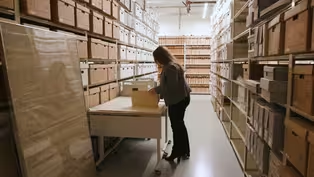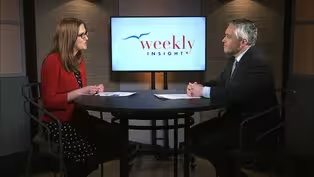
A Life of Service
Clip: Season 5 Episode 7 | 9m 17sVideo has Closed Captions
World War II nurse, Bennie Fleming, reflects on living a life of service
Centenarian Bennie Fleming says she was raised to “give something back” and her life is proof of it. She served as a nurse during World War II when the armed services were still segregated and went on to become an educator in Providence for more than four decades. Rhode Island PBS Weekly’s Michelle San Miguel talks with Fleming about living a life of service and remaining active at 100.
Problems playing video? | Closed Captioning Feedback
Problems playing video? | Closed Captioning Feedback
Rhode Island PBS Weekly is a local public television program presented by Ocean State Media

A Life of Service
Clip: Season 5 Episode 7 | 9m 17sVideo has Closed Captions
Centenarian Bennie Fleming says she was raised to “give something back” and her life is proof of it. She served as a nurse during World War II when the armed services were still segregated and went on to become an educator in Providence for more than four decades. Rhode Island PBS Weekly’s Michelle San Miguel talks with Fleming about living a life of service and remaining active at 100.
Problems playing video? | Closed Captioning Feedback
How to Watch Rhode Island PBS Weekly
Rhode Island PBS Weekly is available to stream on pbs.org and the free PBS App, available on iPhone, Apple TV, Android TV, Android smartphones, Amazon Fire TV, Amazon Fire Tablet, Roku, Samsung Smart TV, and Vizio.
Providing Support for PBS.org
Learn Moreabout PBS online sponsorship(soft piano music) At the age of 100, Bennie Fleming knows by heart all the notes to "Somewhere Over the Rainbow".
(soft piano music) A song that much like her own life story embodies hope.
But the life that Fleming has created for herself in Providence is one she says she never could have imagined as a child.
- That's a family home in San Antonio, Texas, which was just sold four years ago.
- [Michelle] Growing up in south Texas, Fleming dreamed of being a nurse, but she learned it wouldn't be an easy path for a Black woman.
- There were no hospitals in San Antonio that would hire a nurse, a Black nurse.
The only thing I could do was private duty, and that was very expensive.
And you're doing private duty for Black patients, so you know, you didn't have a lot of people who could afford a private nurse.
- [Michelle] It was 1945, the United States was engulfed in World War II.
- [Reporter] Noble women doing a hard job in serving their country in time of need.
- [Michelle] Fleming's friend had joined the U.S. Cadet Nurse Corps and she decided she wanted to do the same.
- I got on the phone and called the Red Cross and said I wanted to volunteer.
And of course, that's how I got into the service.
- [Michelle] Fleming was 21 when she enlisted in the army as a second Lieutenant.
At the time, the armed services were still segregated.
- You lived in a Black dorm while the nurses lived in a white dorm.
You were separated that way.
The Officer's Club was not open to you.
- [Michelle] When she was stationed at Fort Huachuca in Arizona, she met the man who would become her husband, Lieutenant Theodore Fleming, a doctor in the army.
The two went on to witness an historic moment.
In 1948, President Harry Truman signed an executive order banning segregation in the military.
- There shall be equality of treatment and opportunities for all persons in the armed services without regard to race, creed or color.
- Is there one story or something that sticks out to you from that time?
- I don't talk about it too much because I had a chance to see both sides.
- [Michelle] She's referring to her time caring for German POWs at a camp in Arizona, a far different assignment from tending to wounded American soldiers.
- Our boys were coming back from World War II and they were coming back emaciated, they were broken, they had been wounded.
I had these feelings, how could you treat ours so badly when we are treating yours so grandly?
- [Michelle] Nearly 80 years have passed since Fleming served in the army.
Still, she remains physically active.
She enjoys walking through Providence, the city she's called home since 1946.
She admits getting used to the weather took some time.
- I came on July 5th.
I left, San Antonio was 103 degrees, I got here the next day, I almost froze to death.
- What was it?
- I guess it was maybe 70 or 60, I said that normally that, you know, in the summertime.
Oh, I was cold.
The whole summer was cold.
- [Michelle] Several years after moving to Rhode Island, Fleming took a job working full-time at Rhode Island Hospital School of Nursing.
But after two years- - Somebody came into my husband's office and said, "I see you've got your wife working."
That was it, I had to quit.
- Because?
Your husband did not want you working?
- No, he wasn't too happy about it anyway.
My husband is just so, well, he was of that era.
That's my daughter, Jackie.
My son, Theodore.
- [Michelle] Fleming became a stay at home mother for a few years, raising her two children and then made a career change.
- I decided, well, maybe if I went into public education, maybe that would help because I would be out the same time that my kids would be out.
- We are so grateful that you were here and were so honored to be in your presence.
- [Michelle] The Providence City Council recently honored her service to the community, which includes 41 years as an educator in the Providence School District.
(audience applauding) She took on various roles from teaching to overseeing the district science curriculum.
Fleming also made history as the first Black nurse to teach at Rhode Island Hospital.
Service, she says, is in her blood.
- I was taught that you give something back.
- [Michelle] She comes from a long line of family members who've served both in the military and in government.
Her nephew, Ron Kirk, was the mayor of Dallas and the United States trade representative under then President Barack Obama.
Fleming remembers her nephew introducing her to the Obama's while at Martha's Vineyard.
- He insisted on getting my dinner, I didn't have to do anything.
- [Michelle] She also sat on numerous boards from Planned Parenthood of Southern New England to Miriam Hospital.
- I was a trustee for 18 years, that's a long time.
And then I became a Life Governor.
- [Michelle] Fleming remains sharp and mobile at 100.
She still drives and appreciates having the freedom to move around.
She goes for a two mile walk in Providence three times a week down from five days per doctor's orders.
- Because I've been saying I was gonna go to The Good Feet Store and see if they had something that would help with my balance.
- Right - [Michelle] On this day, two friends join her for a stroll down Blackstone Boulevard.
- I was so fortunate, he took me right away and you know, he's a specialized trauma surgeon.
- Oh.
- [Michelle] She lives with her 75-year old son and she credits him with being able to maintain a high quality of life.
- I'm so lucky because people my age are stuck in nursing homes.
Nobody to see them, nobody to do anything for them, but yet I still have people around me and I have young people around me.
- As you reflect on your life, the people you've met, the experiences that you've had, what is the most important lesson you think that you've learned?
- You have to be kind.
I try not to hurt people's feelings.
And I know my kids don't think that, (laughs) and I try not to get into people's business.
(soft piano music) - [Michelle] Instead of meddling in the lives of others, she says she remains focused on enjoying her own.
- At this stage in my life, happiness is all I'm looking for.
You know, tragedy comes, you can't help that.
But fortunately, thank God we've been spared something like that.
(soft piano music)
Video has Closed Captions
Clip: S5 Ep7 | 8m 37s | Dive into the state archive. What treasures could go on display at a new cultural center?? (8m 37s)
Video has Closed Captions
Clip: S5 Ep7 | 5m 43s | Ted Nesi and Michelle San Miguel discuss lawmakers’ inquiries into the Washington Bridge. (5m 43s)
Providing Support for PBS.org
Learn Moreabout PBS online sponsorship
- News and Public Affairs

Top journalists deliver compelling original analysis of the hour's headlines.

- News and Public Affairs

FRONTLINE is investigative journalism that questions, explains and changes our world.












Support for PBS provided by:
Rhode Island PBS Weekly is a local public television program presented by Ocean State Media

